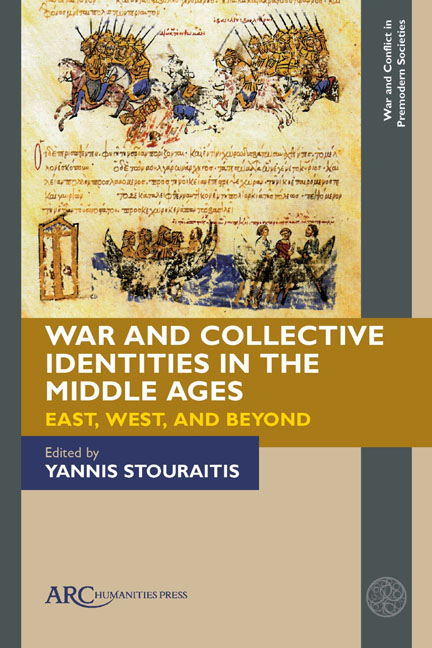Book contents
- Frontmatter
- Contents
- Notes on Contributors
- Chapter 1 War and Peoplehood in the Middle Ages: An Introduction
- Chapter 2 War and Peoplehood through Time: A Sociological Longue Durée Perspective
- Chapter 3 Making War Ethnic: Arab– Persian Identities and Conflict on the Euphrates Frontier
- Chapter 4 Captive Identities: Inscribing Armenianness from Sebēos to Ayrivanec‘i
- Chapter 5 War and Identity in Early Medieval Bulgaria
- Chapter 6 Collective Identifications in Byzantine Civil Wars
- Chapter 7 Warfare and Peoplehood: The Vikings and the English
- Chapter 8 Medieval European Civil Wars: Local and Proto-national Identities of Toulousains, Parisians, and Prague Czechs
- Chapter 9 The Crusades and French Political Identity in the Thirteenth-Century Mediterranean
- Chapter 10 The Song– Jurchen Conflict in Chinese Intellectual History
- Chapter 11 Faithful to a Vanishing Past: Narrating Warfare and Peoplehood in Yuan China
- Chapter 12 War and Collective Identifications in Medieval Societies: Drawing Comparisons
- Selected Bibliography
- Index
Chapter 5 - War and Identity in Early Medieval Bulgaria
Published online by Cambridge University Press: 28 December 2023
- Frontmatter
- Contents
- Notes on Contributors
- Chapter 1 War and Peoplehood in the Middle Ages: An Introduction
- Chapter 2 War and Peoplehood through Time: A Sociological Longue Durée Perspective
- Chapter 3 Making War Ethnic: Arab– Persian Identities and Conflict on the Euphrates Frontier
- Chapter 4 Captive Identities: Inscribing Armenianness from Sebēos to Ayrivanec‘i
- Chapter 5 War and Identity in Early Medieval Bulgaria
- Chapter 6 Collective Identifications in Byzantine Civil Wars
- Chapter 7 Warfare and Peoplehood: The Vikings and the English
- Chapter 8 Medieval European Civil Wars: Local and Proto-national Identities of Toulousains, Parisians, and Prague Czechs
- Chapter 9 The Crusades and French Political Identity in the Thirteenth-Century Mediterranean
- Chapter 10 The Song– Jurchen Conflict in Chinese Intellectual History
- Chapter 11 Faithful to a Vanishing Past: Narrating Warfare and Peoplehood in Yuan China
- Chapter 12 War and Collective Identifications in Medieval Societies: Drawing Comparisons
- Selected Bibliography
- Index
Summary
PERHAPS MORE THAN anywhere else in early medieval Europe, Bulgaria was a society organized for war. For approximately the first two hundred years of its existence, the Bulgar polity was forced onto the defensive in a desperate battle for survival. With far fewer resources than its aggressive Byzantine and Khazar neighbours, it was liable to political collapse in the face of inexorable pressure. Its rulers had therefore little choice but to keep their subjects on a permanent war footing and divert all of the state's resources for military purposes. In the discussion that follows it will be argued that warfare, more than any other factor, had a decisive impact on the political and social development of Bulgaria in the Early Middle Ages. Specifically, the chapter will explore how: i) the high level of militarization resulted in sweeping changes that occurred at almost every social level, but mainly affecting the relationship between the various tribes and clans that constituted the political elite of the Bulgar state; ii) the intense military pressure exerted by its powerful sedentary neighbour, Byzantium, coupled with the growing influence of Christianity in the realm, strengthened the Bulgars’ connection with the steppe imperium and facilitated the development of an aggressive Bulgar “nationalism,” clearly traceable from the middle of the eighth century onwards; iii) the continual contact— military, economic, and cultural— which populations in Bulgaria had with the Byzantine world appear to have created both a high level of “Byzantine awareness” as well as a perception of the empire as “the other.” Such an awareness, among other things, strengthened political ties between the heterogeneous components of the state and reinforced the sense of collective Bulgar identity.
The Emergence of the Bulgar State
The Bulgar state or khanate in the Balkans was established in the early 680s by a group of nomadic warriors of Türkic-Oğuric origin, who had been present in the steppes north of the Black Sea at least since the fourth century. Around the first quarter of the seventh century, one of their leader, a certain Kubrat, is said to have thrown off Avar rule and to have created an independent polity in the Lower and Middle Dnieper region, “Old Great Bulgaria,” which maintained close diplomatic relations with the Byzantine Empire.
- Type
- Chapter
- Information
- War and Collective Identities in the Middle AgesEast, West, and Beyond, pp. 87 - 98Publisher: Amsterdam University PressPrint publication year: 2023
- 1
- Cited by



